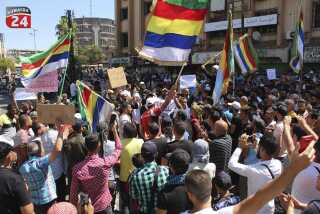Algeria’s Liberal Climate Spawns Protests as Citizens Sample Reform : Third World: Local officials face accusations of mismanagement and corruption. Reformist president presses efforts to revive a stagnant economy and create a true multiparty democracy.
- Share via
ALGIERS, Algeria — Masoud Muslim struggled to prop himself up, weakened by fatigue on the 11th day of a hunger strike to try to win housing for his family.
“Before, they would have cut our heads off for this,” he whispered, surrounded by sympathizers in a tent pitched in front of a suburban town council. “At least now you can demand your rights.”
After 27 years of stifling one-party rule, during which strikes and rallies were banned, Algerians are marching, striking and shouting to voice long pent-up grievances.
A wave of protests is sweeping the country from Skikda in the east--where angry workers threatened in November to close the port--to the western city of Mostaganem--where students demanded better allowances.
The protests pose a challenge to reformist President Chadli Benjedid as he strives to revive a stagnant economy and create a true multi-party democracy rare in the Third World.
“Democracy has boosted expectations and opened a Pandora’s box of long-repressed grievances,” said a senior Western diplomat. “Many of these demands are difficult if not impossible to meet.”
A new constitution, adopted after youth riots rocked the country in October, 1988, legalized strikes and rallies. Now rarely a day goes by without some sort of protest.
At the sprawling Club des Pins conference center west of Algiers, host to Arab summits and an historic meeting last year of the Palestine National Council, workers recently ended a 3 1/2 1/2-week hunger strike aimed at removing the director.
Mail services came to an abrupt halt in central Algiers Nov. 15, about the same time that merchants shuttered shops in the eastern city of Annaba to protest a new price law restricting their profit margins.
In Gue de Constantine, a working-class Algiers suburb of shanties and state housing, 14 residents launched a hunger strike--later suspended--Nov. 2 to protest the way they said new homes were allocated.
Masoud Muslim and his colleagues had vowed to live on sugared water until they won a promise of decent housing and the replacement of council members.
They suspended their protest pending a decision by the provincial governor on whether to replace the town council president.
In a country where a burgeoning population of 24 million lives on average seven to a room, the distribution of new housing is often the spark which ignites sit-ins, occupations of town councils and street demonstrations.
Officials insist that the protests are a natural and healthy consequence of Algeria’s “perestroika”-- sweeping political and economic reforms aimed at liberalizing a state-run economy and installing a Western-style parliamentary democracy.
“The assemblage of acts, gestures and words fill our world to give the impression of a spill-over irritating the march of reforms, even endangering the success of democracy,” the editor of the official Algerian news agency APS wrote recently. “In fact, these are only the very natural manifestations of citizens who have recovered their voice,” Belkacem Ahcene-Djaballah added.
Social Affairs Minister Mohammed Ghrib said Nov. 15 that 50 “legitimate” strikes were under way across the country. He attributed them to a lack of clear channels of dialogue within state firms pending new laws on strikes and labor relations.
Diplomats say the protests do not directly threaten Chadli’s reform drive and may even strengthen it by exposing old guard elements of his ruling who are resisting change.
Many of the protests target National Liberation Front officials in local government or the official trade union UGTA who are accused of mismanagement and corruption.
Party reformists say such officials must be replaced if the FLN, of which Chadli is president, is to regain public trust and revive a tarnished image.
But officials have also expressed concern over the effect of labor unrest on an economy burdened by a huge foreign debt, an unemployment rate of more than 20% and double-digit inflation.
The Social Affairs Ministry reported strikes in 90 state industrial firms from November, 1988, to June, 1989, representing 380,000 lost work-days.
Officials also complain that newly legal political parties, mainly communists and Islamic fundamentalists, are stirring up trouble for political gain.
“We are all for democracy, but democracy is not anarchy,” a senior union official told Reuters.
More to Read
Sign up for Essential California
The most important California stories and recommendations in your inbox every morning.
You may occasionally receive promotional content from the Los Angeles Times.










